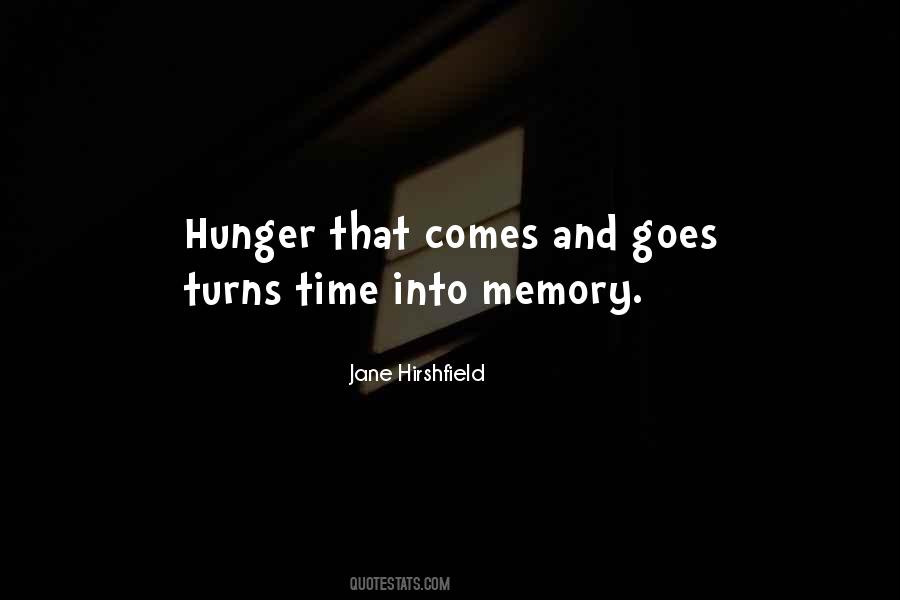
Top 100 Jane Hirshfield Quotes
#1. I'm sure I've been influenced by every fine writer I've ever read, from Dickens and Austen to Auden and Jane Hirshfield. And also, the short stories of Updike, Cheever, Munro, Alice Adams, and Doris Lessing. And the plays of Oscar Wilde. And paintings by Alice Neel and Matisse.
Amy Bloom

#3. Here are poems from a new generation of writers who honor the magnetic fields of the real; who feel and think with full and open-eyed passion; who focus heat as the magnifying glass focuses sun: until the paper catches. Read them.
Jane Hirshfield

#4. Poems ... are perfume bottles momentarily unstopped - what they release is volatile and will vanish, and yet it can be released again,
Jane Hirshfield
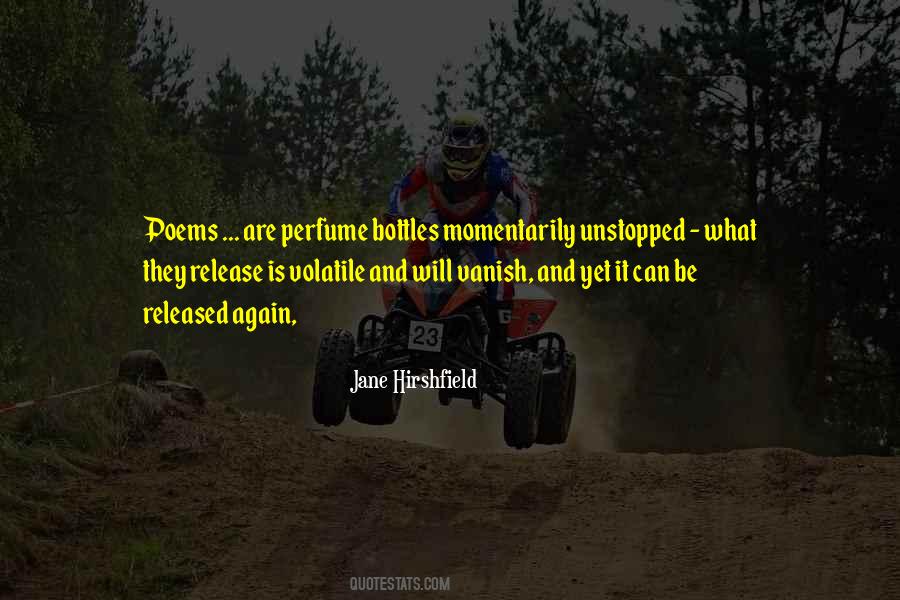
#5. The writing of an assay-type poem or a poem investigating perspective isn't an exercise of rational or strategic mind. Poems for me are acts of small or large desperation. They grapple with surfaces too steep to walk in any other way, yet which have to be traveled.
Jane Hirshfield

#6. In the dream life, you don't deliberately set out to dream about a house night after night; the dream itself insists you look at whatever is trying to come into visibility.
Jane Hirshfield

#8. You can't write an image, a metaphor, a story, a phrase, without leaning a little further into the shared world, without recognizing that your supposed solitude is at every point of its perimeter touching some other.
Jane Hirshfield
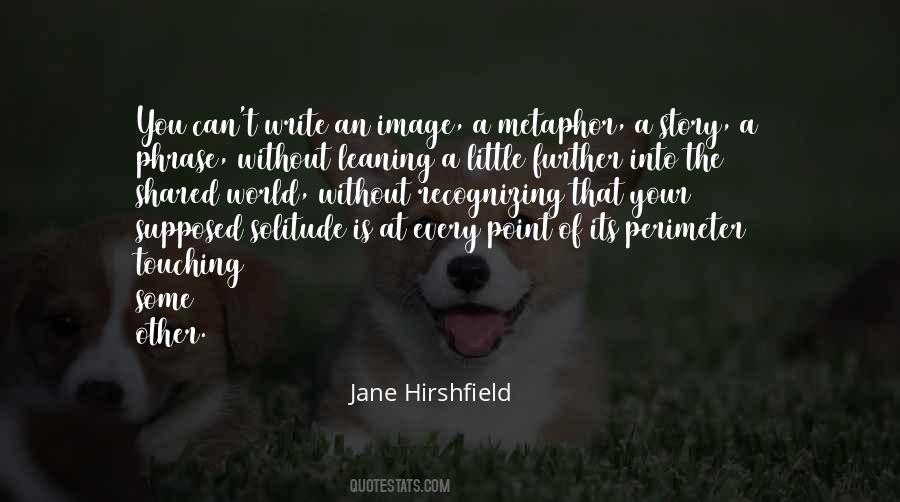
#9. A certain amount of housekeeping also goes on in my poems. I wash doorknobs, do dishes, mop floors, patch carpets, cook.
Jane Hirshfield

#10. I don't work on poems and essays at once. They walk on different legs, speak with different tongues, draw from different parts of the psyche. Their paces are also different.
Jane Hirshfield

#11. Do not follow the ancient masters, seek what they sought.
Jane Hirshfield

#12. The moonlight builds its cold chapel again out of piecemeal darkness.
Jane Hirshfield

#13. Within the silence, expansion, and sustained day by day concentration, I grow permeable.
Jane Hirshfield
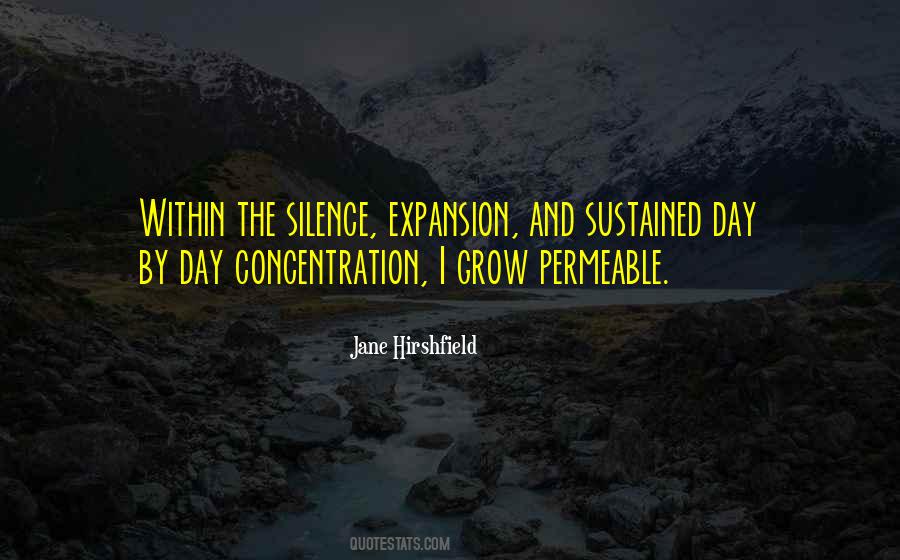
#14. Poetry's task is to increase the available stock of reality, R P Blackmur said.
Jane Hirshfield

#15. Poetry's work is the clarification and magnification of being.
Jane Hirshfield

#19. Sam Hamill is a writer unabashedly taking his place within the community of literature and the community of all sentient beings-his fidelity is to the magnificent truth of existence, and to its commensurate singing.
Jane Hirshfield

#20. I see poetry as a path toward new understanding and transformation, and so I've looked at specific poems I love, and at poetry's gestures in the broadest sense, in an effort to feel and learn what they offer from the inside.
Jane Hirshfield

#21. Age in itself gives substance - what has lasted becomes a thing worth keeping. An older poem's increasing strangeness of language is part of its beauty, in the same way that the cracks and darkening of an old painting become part of its luminosity in the viewer's mind.
Jane Hirshfield

#22. Everything has two endings-
a horse, a piece of string, a phone call.
Before a life, air.
And after.
As silence is not silence, but a limit of hearing.
Jane Hirshfield

#23. You may do this, I tell you, it is permitted. Begin again the story of your life.
Jane Hirshfield

#24. [A]rt can't ever be programmatic ... it needs on the contrary to be complicating, subtle, questioning, doubtful and doubting.
Tony Leuzzi

#27. The nourishment of Cezanne's awkward apples is in the tenderness and alertness they awaken inside us.
Jane Hirshfield

#28. A tree lives on its roots. If you change the root, you change the tree. Culture lives in human beings. If you change the human heart the culture will follow.
Jane Hirshfield

#29. One recurring dream, many others have also: you go into a familiar house, discover a door or hallway, and find the house continues into hidden rooms. Sometimes a whole second house is there, a larger and unknown extension of the familiar dwelling.
Jane Hirshfield

#30. There is a door. It opens. Then it is closed. But a slip of light stays, like a scrap of unreadable paper left on the floor, or the one red leaf the snow releases in March
Jane Hirshfield

#31. And that other self, who watches me from the distance of decades,
what will she say? Will she look at me with hatred or with compassion,
I whose choices made her what she will be?
Jane Hirshfield
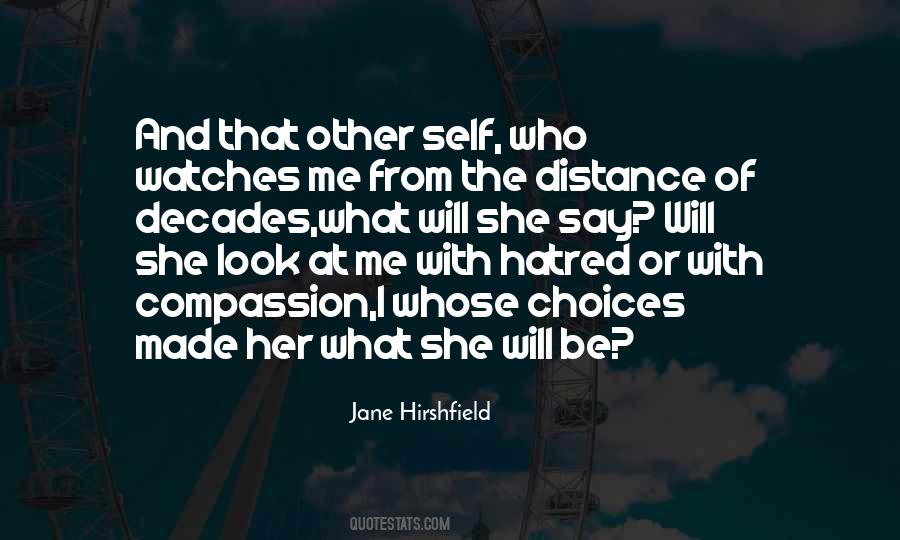
#32. Art-making is learned by immersion. You take in vocabularies of thought and feeling, grammar, diction, gesture, from the poems of others, and emerge with the power to turn language into a lathe for re-shaping, re-knowing your own tongue, heart, and life ...
Jane Hirshfield

#33. I travel as much as I do. It isn't the life I expected. I don't know what dust of pollen will come back with me from these travels.But I must trust that I will not treat frivolously the glimpses I've been given into other places and others' lives.
Jane Hirshfield

#34. China
Whales follow
the whale-roads.
Geese,
roads of magnetized air.
To go great distance,
exactitudes matter.
Yet how often
the heart
that set out for Peru
arrives in China,
Steering hard.
consulting the charts
the whole journey.
Jane Hirshfield

#35. There are worlds / in which nothing is adjective, everything noun.
Jane Hirshfield

#36. Art can be defined as beauty able to transcend the circumstances of its making.
Jane Hirshfield

#37. Houses are fundamental metaphors for self, world, permeability, transition, interiority, exteriority, multiplicity, and the power to move from one state of being to another.
Jane Hirshfield
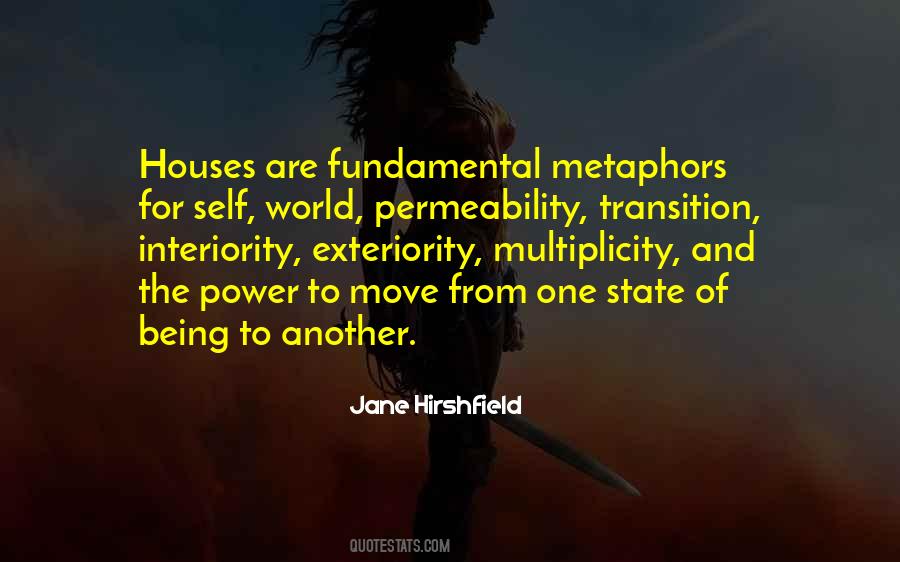
#38. Go back to The October Palace, which came out in 1994, and there are poems with windows, doors, the rooms of the gorgeous and vanishing palace that is this ordinary world and ordinary life. Jungian archetype would say the house is a figure for the experienced, experiencing self.
Jane Hirshfield

#39. Each poet probably has his or her own cupboard of magnets. For some, it is cars; for others, works of art, or certain patterns of form or sound; for others, certain stories or places, Philip Levine's Detroit, Gwendolyn Brooks's Chicago, Seamus Heaney's time-tunneled, familied Ireland.
Jane Hirshfield

#40. Habit, laziness, and fear conspire to keep us comfortably within the familiar.
Jane Hirshfield

#41. Zen taught me how to pay attention, how to delve, how to question and enter, how to stay with
or at least want to try to stay with
whatever is going on.
Jane Hirshfield

#42. Good poems ask us to have complex minds and hearts. Even simple-of-surface poems want that. Perhaps those are the ones that want it most of all, since that's where they do their work: in the unspoken complexities, understood off the page.
Jane Hirshfield
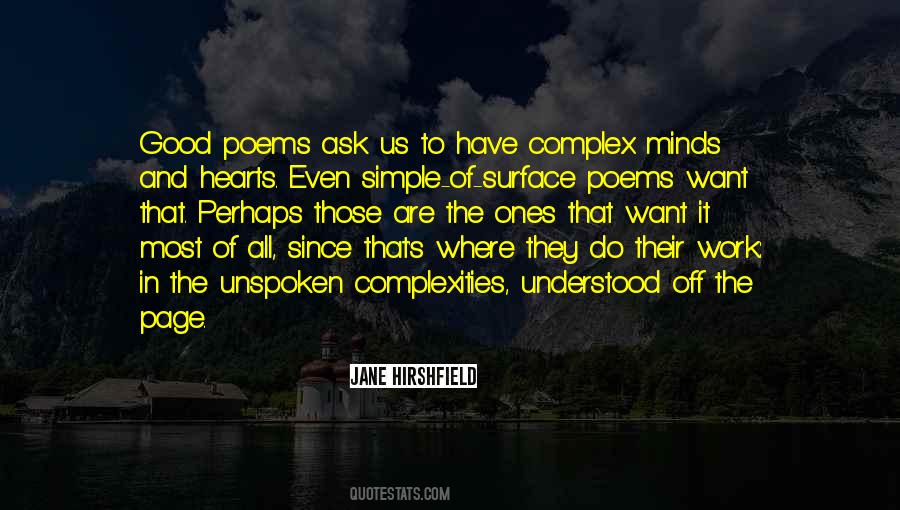
#43. History, mythology, and folktales are filled with stories of people punished for saying the truth. Only the Fool, exempt from society's rules, is allowed to speak with complete freedom.
Jane Hirshfield

#44. So few the grains of happiness measured against all the dark and still the scales balance.
Jane Hirshfield

#45. The heft of a life in the hands grows both lighter and weightier. Over time, my life has become more saturated with its shape and made-ness, while my poems have become more and more free. The first word of every poem might be "Yes." The next words: "And then."
Jane Hirshfield

#46. Every morning is new as the last one, uncreased as the not quite imaginable first.
Jane Hirshfield
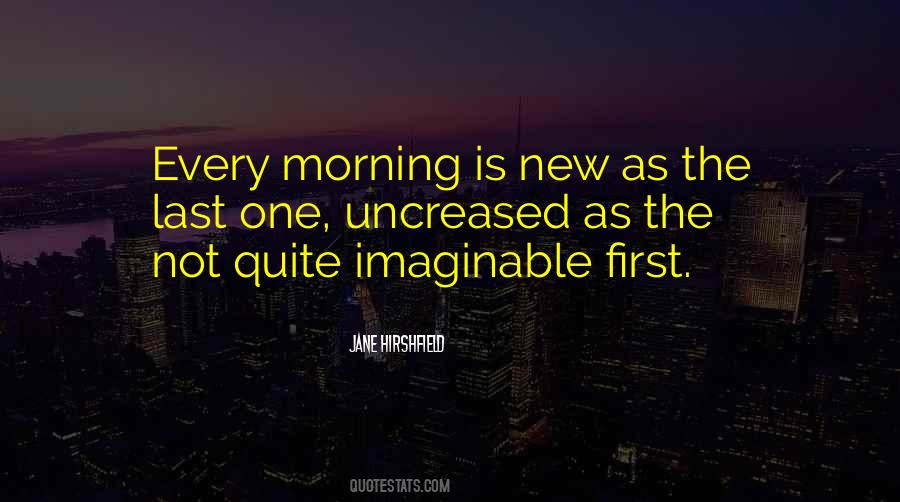
#47. Clear moon, a boy afraid of foxes walked home by his lover
Jane Hirshfield

#48. At some point, I realized that you don't get a full human life if you try to cut off one end of it; that you need to agree to the entire experience, to the full spectrum of what happens.
Jane Hirshfield

#49. When I write, I don't know what is going to emerge. I begin in a condition of complete unknowing, an utter nakedness of concept or goal. A word appears, another word appears, an image. It is a moving into mystery.
Jane Hirshfield

#50. Metaphors get under your skin by ghosting right past the logical mind.
Jane Hirshfield
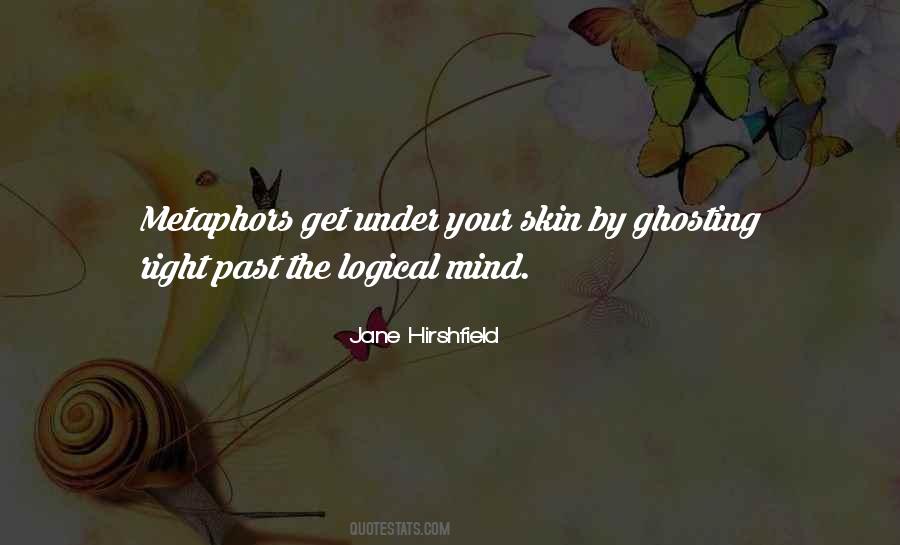
#51. As this life is not a gate, but the horse plunging through it.
Jane Hirshfield

#52. A studio, like a poem, is an intimacy and a freedom you can look out from, into each part of your life and a little beyond.
Jane Hirshfield

#53. Leave a door open long enough, a cat will enter. Leave food, it will stay.
Jane Hirshfield

#54. It's one of the saving graces in a life, to be able to perceive one's own and others' absurdity, to notice our shared human frailties and be able, at least some of the time, to smile rather than grimace. Like most people, I must have started out with a comic worldview in my cupboard.
Jane Hirshfield

#55. Any woodthrush shows it - he sings, not to fill the world, but because he is filled.
Jane Hirshfield

#56. The first poem in The Beauty holds a woman in Portugal in a wheelchair singing, with great power, a fado. I have never seen this or heard of it, the image simply arrived. But surely such a thing has happened. And it matters to me that it has, or could.
Jane Hirshfield

#57. In my poems though, as you say, the comic arrived fairly late. This doubtless has something to do with growing older. A person who's seen a bit of the world can't help but notice how foolish is the self-centeredness we bring to our tiny slice of existence.
Jane Hirshfield
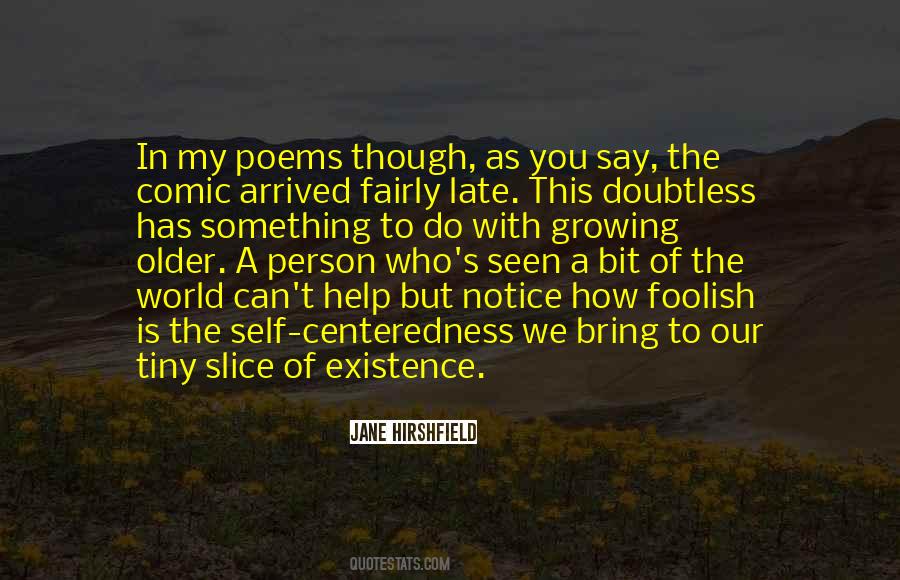
#58. A poem makes clear without making simple. Poetry's language carries what lives outside language. It's as if you were given a 5-gallon bucket with 10 gallons of water in it. Mysterious thirsts are answered. That alchemical bucket carries secrets also, even the ones we keep from ourselves.
Jane Hirshfield

#60. Poems' deep work is a matter of language, but also a matter of life. One part of that work is to draw into our awareness and into language itself the unobvious and the unexpected.
Jane Hirshfield
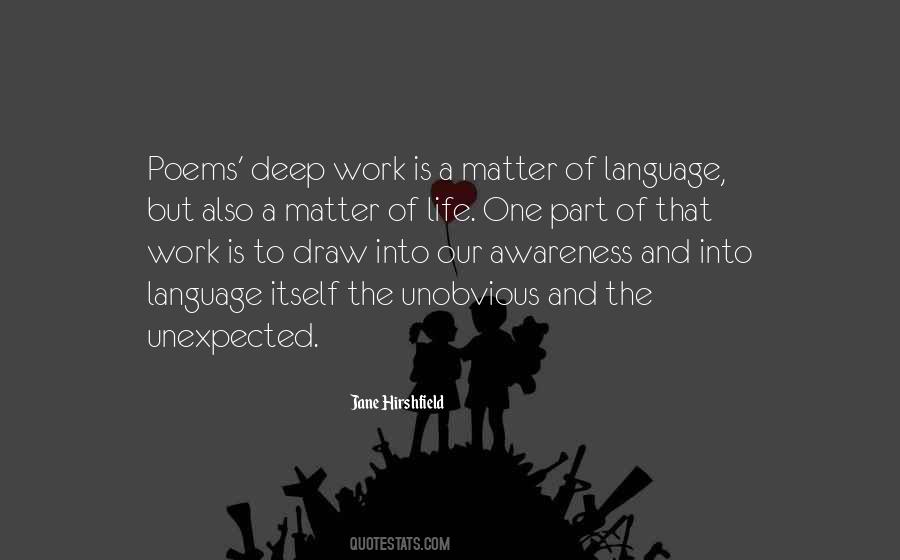
#61. Poems are always interested in what Ivan Illich called 'shadow work,' not least because that is no small part of their own way of working.
Jane Hirshfield

#62. How fine is the mesh of death. You can almost see through it.
Jane Hirshfield

#63. Metaphors think with the imagination and the senses. The hot chili peppers in them explode in the mouth and the mind.
Jane Hirshfield

#64. A poem's essential discovery can happen at a single sitting. The cascade of discoveries in an essay, or even finding a question worth exploring in one, seems to need roughly the time it takes to plant and harvest a crop of bush beans.
Jane Hirshfield

#65. The trick, though, is to not lose compassion, to not allow the sense of absurdity to outweigh the awareness of real beings, with real feelings. Mean-spirited humor turns the world into cardboard, the way Midas's simple-minded greed turned food into inedible and useless stuff.
Jane Hirshfield

#66. Passion does not make careful arguments: it declares itself, and that is enough.
Jane Hirshfield

#67. I think, though, that perspective-awareness may follow from a kind of speaking that also came into my work more recently - the "assay" poems (some labeled that, some not) that engage an abstraction or object from multiple angles.
Jane Hirshfield

#68. Perimeter is not meaning, but it changes meaning,/as wit increases distance, and compassion erodes it.
Jane Hirshfield

#69. Neither a person entirely broken
nor one entirely whole can speak.
In sorrow, pretend to be fearless. In happiness, tremble.
Jane Hirshfield
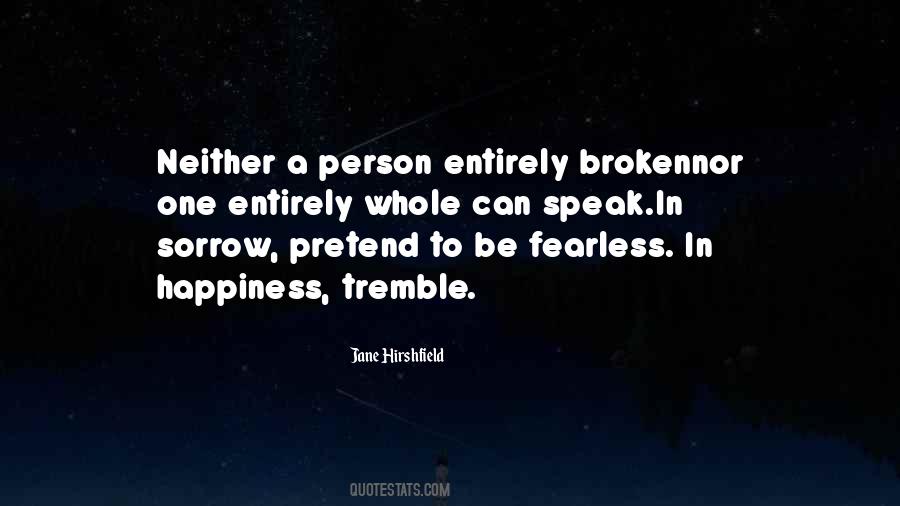
#70. "And" seems to me closest. "And" nods toward the real. And "and" is the path to perspective. To feel and see from more angles and know all of them true, even the incomprehensible ones, even the ones that contradict one another.
Jane Hirshfield

#73. The Cloudy Vase
Past time, I threw the flowers out,
washed out the cloudy vase.
How easily the old clearness
leapt, like a practiced tiger, back inside it.
Jane Hirshfield

#74. The heart's actions
are neither the sentence nor its reprieve.
Salt hay and thistles, above the cold granite.
One bird singing back to another because it can't not.
Jane Hirshfield

#75. What lives in words is what words were needed to learn.
Jane Hirshfield

#76. Near even a candle, the visible heat. So it is with a person in love.
Jane Hirshfield

#77. One way poetry connects is across time ... Some echo of a writer's physical experience comes into us when we read her poem.
Jane Hirshfield

#78. if you see for yourself, hear for yourself, and enter deeply enough this seeing and hearing, all things will speak with and through you.
Jane Hirshfield

#79. In order to gain anything, you must first lose everything
Jane Hirshfield

#80. Zen is less the study of doctrine than a set of tools for discovering what can be known when the world is looked at with open eyes.
Jane Hirshfield

#81. One reason to write a poem is to flush from the deep thickets of the self some thought, feeling, comprehension, question, music, you didn't know was in you, or in the world.
Jane Hirshfield

#82. I want to understand the piers of language and music and comprehension that can hold up a building even when what the building houses is an earthquake. This thinking must surely come into the poems I write, but more by osmosis than will.
Jane Hirshfield

#83. What we want from art is whatever is missing from the lives we are already living and making. Something is always missing, and so art-making is endless.
Jane Hirshfield

#84. In a room with many windows
some thoughts slide past uncatchable, ghostly.
Jane Hirshfield

#85. Your fate is to be yourself, both punishment and crime.
Jane Hirshfield

#86. This garden is no metaphor - more a task that swallows you into itself, earth using, as always, everything it can.
Jane Hirshfield

#87. Poetry is a release of something previously unknown into the visible. You write to invite that, to make of yourself a gathering of the unexpected and, with luck, of the unexpectable.
Jane Hirshfield
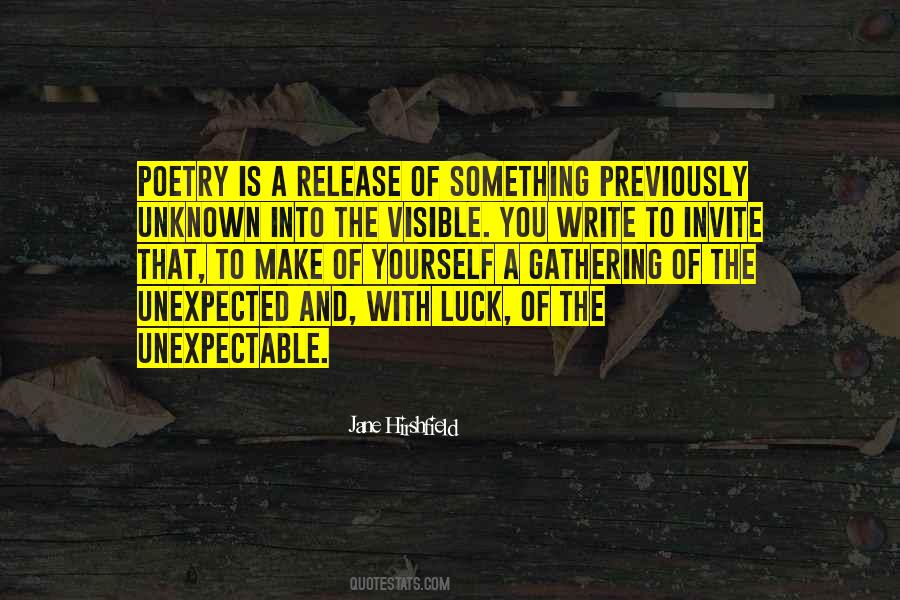
#88. There are openings in our lives
of which we know nothing.
Jane Hirshfield

#89. over 19,000 haiku about Spam - "Spamku" - have to this date been posted online.
Jane Hirshfield

#90. Gestation requires protected space; ripening requires both permeability to the outer - and non-disturbance.
Jane Hirshfield

#93. One breath taken completely; one poem, fully written, fully read - in such a moment, anything can happen.
Jane Hirshfield

#94. The pressed oil of words can blaze up into music, into image, into the heart and mind's knowledge. The lit and shadowed places within us can be warmed.
Jane Hirshfield

#95. A person is full of sorrow the way a burlap sack is full of stones or sand.
Jane Hirshfield
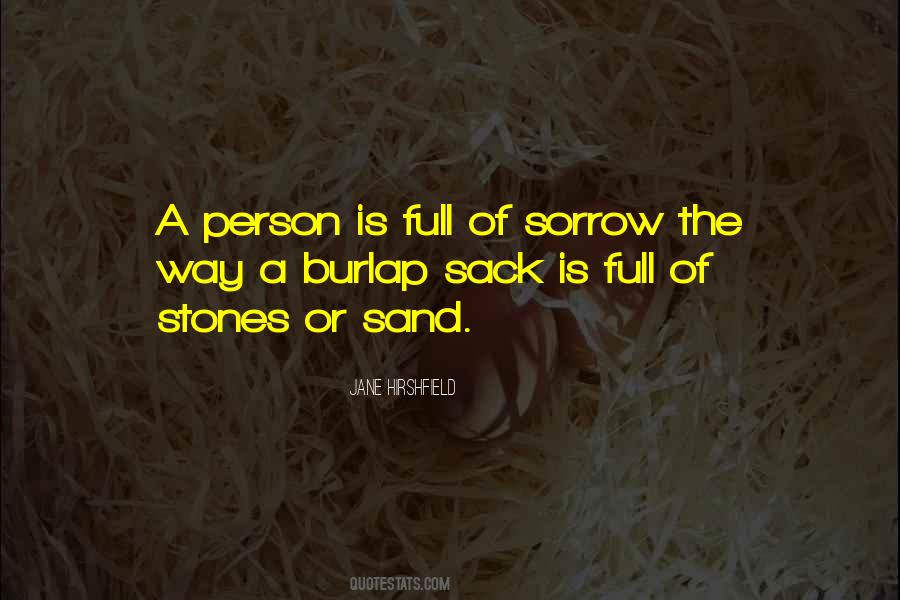
#97. At another level, though, poems can craft an eraser - we can't revise the past, but poems allow us some malleability, an increased freedom of response, comprehension, feeling. Choice, what choices are possible for any given person, is another theme that's run through my work from the start.
Jane Hirshfield

#98. Something looks back from the trees,
and knows me for who I am.
Jane Hirshfield

#99. Words are not the end of thought, they are where it begins.
Jane Hirshfield

#100. How sad they are, the promises we never return to. They stay in our mouths, roughen the tongue, lead lives of their own.
Jane Hirshfield

Famous Authors
Popular Topics
Scroll to Top


























































